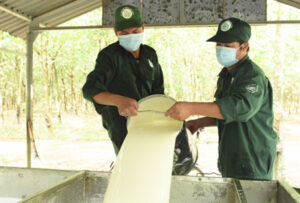Vietnam Rubber Association forecasts increased rubber prices in 2022
Hanoi, Vietnam – The scarcity of rubber raw materials is forecast to continue in 2022, and world rubber is entering a new price increase cycle due to the decreasing supply, opening an optimistic picture for Vietnamese rubber enterprises to enjoy the dual benefits in terms of both export volume and value.
According to statistics of the Ministry of Agriculture and Rural Development, in 2021, thanks to the continuous increase in rubber prices, although the export volume only increased by 11.7 percent, the turnover soared by 36.2 percent year-on-year.
China maintained Vietnam’s largest rubber importer, with 1.2 million tonnes worth 1.96 billion USD in the first 11 months of 2021, equivalent to increases of 1.71 percent in volume and 26.3 percent in value over the same period in 2020. In addition, some rubber export markets saw sharp rises in the past year such as the US, the European Union (EU), Malaysia, the Republic of Korea and India.
The Vietnam Rubber Association (VRA) forecasts that the global supply of natural rubber may lack due to the impact of the prolonged rainy season in some Asian countries at the end of 2021. Therefore, the export momentum is showing no sign of decreasing. Not to mention, when the scarcity of raw materials may maintain, the price of rubber latex will continue to increase or stay at a high level, thus improving the profit margin of businesses.
According to VNDirect Securities Joint Stock Company, the growth of the rubber industry, especially export-oriented firms, in 2022, is further supported by the strong surge of oil prices, as well as economic recovery expectations.
A total of 100,000 ha of rubber plantations of Vietnam Rubber Group (VRG) are expected to get an international sustainable forest management certificate in accordance with the Vietnam Forest Certification Scheme (VFCS) and the Programme for the Endorsement of Forest Certification (PEFC) in the first quarter of 2022.
So far, 55,000 hectares of rubber plantations of VRG have been awarded the certificate.
With the existing certified area, 85,000 tonnes of natural rubber and 300,000 tonnes of certified sustainable rubber wood will be exploited for commercial production.
This is expected to help increase the value of the rubber exploitation chain, towards sustainable development in the entire supply chain to meet the needs of the export and domestic markets for sustainable products.

